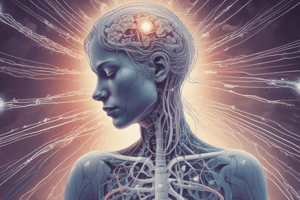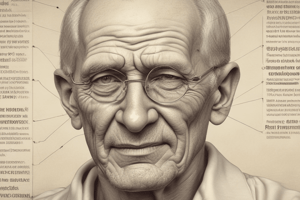Podcast
Questions and Answers
What is the primary treatment method mentioned for spinal stenosis?
What is the primary treatment method mentioned for spinal stenosis?
- Mulligans mobilisations (correct)
- Corticosteroid injections
- Regular aerobic exercise
- Surgical intervention
Which movement pattern is preferred by individuals with spinal stenosis?
Which movement pattern is preferred by individuals with spinal stenosis?
- Swimming and cycling
- Leaning over a trolley (correct)
- Walking and standing
- Running and jumping
What is emphasized in core training related to spinal health?
What is emphasized in core training related to spinal health?
- Pilates and motor control (correct)
- Strengthening hip flexors only
- Reducing movement variability
- Maximal weight lifting
Which demographic is most prone to spinal stenosis according to the content?
Which demographic is most prone to spinal stenosis according to the content?
Which exercise is specifically mentioned as a part of functional testing?
Which exercise is specifically mentioned as a part of functional testing?
What is a characteristic of stenosis in relation to pain distribution?
What is a characteristic of stenosis in relation to pain distribution?
Which assessment technique is indicated for evaluating lumbar spine radicular pain?
Which assessment technique is indicated for evaluating lumbar spine radicular pain?
What symptom distinguishes radiculopathy from radicular pain?
What symptom distinguishes radiculopathy from radicular pain?
What is the prognosis for lumbar spine radicular pain?
What is the prognosis for lumbar spine radicular pain?
Which exercise is recommended for maintaining conditioning in patients with knee pain?
Which exercise is recommended for maintaining conditioning in patients with knee pain?
Which assessment technique is used to evaluate the range of motion of the lower back?
Which assessment technique is used to evaluate the range of motion of the lower back?
What is considered the best treatment option for patients with low back pain?
What is considered the best treatment option for patients with low back pain?
Which technique is used to treat localized, diffuse pain with a focus on improving range of motion?
Which technique is used to treat localized, diffuse pain with a focus on improving range of motion?
Which type of education is important in the management of non-specific lower back pain?
Which type of education is important in the management of non-specific lower back pain?
What does the acronym PAIVMs stand for in the context of lower back pain assessment?
What does the acronym PAIVMs stand for in the context of lower back pain assessment?
Which of the following methods is NOT typically used for managing non-specific lower back pain?
Which of the following methods is NOT typically used for managing non-specific lower back pain?
During a neuro assessment for lower back pain, which test primarily evaluates nerve root tensions?
During a neuro assessment for lower back pain, which test primarily evaluates nerve root tensions?
In addressing lower back pain, what is a primary goal of exercise programs?
In addressing lower back pain, what is a primary goal of exercise programs?
What is a characteristic of nerve sensitivity to mechanical stimuli?
What is a characteristic of nerve sensitivity to mechanical stimuli?
What does the prognosis for nerve sensitivity indicate?
What does the prognosis for nerve sensitivity indicate?
What is the incidence of Cauda Equina syndrome?
What is the incidence of Cauda Equina syndrome?
Which symptom is commonly associated with cancer in the context provided?
Which symptom is commonly associated with cancer in the context provided?
Which of the following could be a secondary condition affecting nerve sensitivity?
Which of the following could be a secondary condition affecting nerve sensitivity?
Which symptom is least likely to indicate a condition related to lumbar pain?
Which symptom is least likely to indicate a condition related to lumbar pain?
What is the purpose of sliders in neurodynamic treatment?
What is the purpose of sliders in neurodynamic treatment?
Which of the following tests is specifically a neurodynamic assessment?
Which of the following tests is specifically a neurodynamic assessment?
What does the Bell test assess?
What does the Bell test assess?
Which statement about myotome testing is incorrect?
Which statement about myotome testing is incorrect?
What is the primary goal of traction in manual therapy?
What is the primary goal of traction in manual therapy?
Which therapeutic exercise is specifically associated with the McKenzie method?
Which therapeutic exercise is specifically associated with the McKenzie method?
Decreased reflexes in the Achilles and patellar tendon suggest which of the following?
Decreased reflexes in the Achilles and patellar tendon suggest which of the following?
Flashcards are hidden until you start studying
Study Notes
Non-specific Lower Back Pain Treatments
- Pain neuroscience education emphasizes understanding natural history, maintaining activity, and realistic expectations.
- Mobilizations consider derangement, dysfunction, and posture.
- PAIVMs (Passive Accessory Intervertebral Movements):
- Central PA and Transverse glide techniques help assess and treat vertebral segments.
- PPIVMs (Passive Physiological Intervertebral Movements):
- Mulligan’s techniques address localized pain and restricted range of motion (ROM).
- Manipulation techniques like lumbar distraction aid in treating osteoarthritis (OA) and radiculopathies.
- Exercise is the most effective treatment; options include:
- Core strengthening, Pilates, functional restoration, and McKenzie method.
- Specific exercises: prone cobra, cat/cow, bird dog, pelvic neutral, plank, superman, double leg bridge.
- Assessments include:
- ROM evaluations: flexion, extension, lateral flexion, rotation.
- Neuro assessments: straight leg raise (SLR), slump test, sensory, and reflex checks.
- Functional tests for endurance and movement tasks.
Spinal Stenosis Treatments
- Spinal stenosis involves degenerative changes causing spinal canal narrowing, common in individuals over 75.
- Characteristics include preference for flexion and sitting, exacerbated by standing or walking, and bilateral thigh pain.
- The Cook clinical decision rule indicates likelihood with age > 48 years, bilateral symptoms, and specific pain patterns.
- Assessments involve ROM evaluation, neuro assessments, and locating L4 for PAIVMS checks.
Lumbar Spine Radicular Pain and Radiculopathy Treatments
- Radicular pain is sharp and shooting, while radiculopathy includes signs of nerve compromise, like decreased sensation and reflexes.
- Ensure imaging for the complete absence of myotomes indicates a potential orthopedic review.
- Education about prognosis shows 85% recovery within 12 months; significant weakness warrants further evaluation.
- Treatment options:
- Short-term relief can include massage, heat therapy, and manual therapy techniques like traction.
- Effective exercise regimes are vital, including motor control and McKenzie exercises.
Neuromechanical Sensitivity and Lower Limb Treatment
- Neuromechanical sensitivity pertains to how lower limbs and nerves respond to mechanical stimuli during movement.
- Assessment includes nerve palpation, myotome, and neurodynamic tests.
- Treatment techniques include:
- Sliders for nerve bed sliding with minimal strain.
- Tensioners for prolonged nerve bed elongation.
- Education is crucial to help patients understand their condition's nature and protective nerve responses.
Red Flag Conditions
- Red flags, indicating serious underlying conditions include:
- Cauda Equina syndrome: Low back pain, urinary changes, loss of bowel control.
- Cancer: Symptoms such as unexplained weight loss and persistent pain warrant immediate concern.
Studying That Suits You
Use AI to generate personalized quizzes and flashcards to suit your learning preferences.




